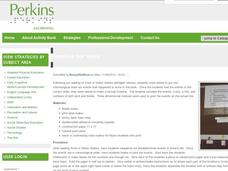Perkins School for the Blind
Modified T-Ball
Baseball can be so entertaining! Here are a few great ideas you can use to get your learners with visual impairments out on the old ball field. A sound-enhanced pitching device or T-ball stand is used to alert players when it's time to...
Perkins School for the Blind
The Mystery Box - Making Observations and Collecting Data
Making observations and collecting qualitative and quantitative data is a vital skill all scientists need to practice. Help your scientists with partial and no sight learn how to use their other senses to make observations for...
Curated OER
Function Lesson Plan -- Asking for Repetition
Students with disabilities are tested in the use of language and taught the skill of asking for repetition in order to gain clarification and thus improve comprehension. They are assessed according to the practice of asking with...
Perkins School for the Blind
A Visit to the Doctor
Going to the doctor's office may be a source of stress and uncertainty for some children. Help your learners with special needs discover what to expect at and how to cope with their next trip to the doctor. They explore real medical...
Perkins School for the Blind
Volume, Mass, and Density Boxes
Mass and density are difficult topics for kids to understand, and even more difficult when you have visual impairments or blindness. Learners will make boxes and fill them with cotton, sand, or crushed paper. They will feel the density...
Perkins School for the Blind
Human Body Regulation
The human body can regulate itself through sweating and resting. Learners with visual impairments discuss how the body changes when it is under stress and what it does to regulate itself. To start, kids use talking thermometers to take...
Curated OER
Phonics Help: The Phonic Alphabetic Code Chart
Phonics is a fundamental key to reading success. To help your learners with dyslexia or learning disabilities, try using the phonic alphabetic code chart. The chart and full instructions on how it can be used in the classroom are...
Perkins School for the Blind
Tug of War
Don't be fooled by how short this instructional activity is; it contains a good idea for adaptive PE. The activity is intended to help learners with visual impairments increase motor skills, muscle strength, and mobility. Two kids play a...
National First Ladies' Library
"Just a Little Bit Different": Inclusive Classrooms, Inclusive Schools
Learners explore visible and invisible differences, those of language, religion, dress, ethnicity, gender, etc. with their classmates. They play Bingo with a created list of classroom differences. Afterward, they write a short paper...
Curated OER
Seeing the World Through A Different Lens
Students participate in activities in which they model different disabilities. They discuss their experiences as a class. They work together in groups to discuss how to improve an adaptive device.
Curated OER
Reading Without Seeing: Louis Braille and the Braille Alphabet
Students study Louis Braille and the history of the Braille alphabet. They participate in an activity using the sense of touch to determine how the Braille alphabet works.
Perkins School for the Blind
Tactile quilts that tell a story
Learners with multiple disabilities need to engage in projects that push them to know their full potential. They need to be able to express themselves in a variety of ways, and this very thoughtful lesson does just that. They make a...
Perkins School for the Blind
Beginning Map Skills
Maps can be so much fun, they help you understand spatial relationships, distance between objects, and can foster direction skills. Budding cartographers with visual impairments use the Wheatley Tactile Diagramming Kit to create their...
Curated OER
Lesson 6: Mittens, Socks, Mittens, Socks, Mittens!
Mittens and socks, two of my favorite clothing items! Young learners with special needs, explore clothing appropriate for cold weather. They identify both socks and mittens, discuss weather appropriate clothing, and listen to the story,...
Perkins School for the Blind
Making Choices
Here is an excellent and well-developed lesson intended to promote choice-making skills for learners with visual impairment and intellectual disabilities. It fosters choice-making skills through a soft version of discrete trial training,...
Perkins School for the Blind
Integrated Skills - Laundry
I hate doing laundry, even if it is an independent living skill that requires me to count money, follow a sequence, and sort clothing by color. Learners with multiple disabilities discuss what laundry is, why they need to do it, and how...
Perkins School for the Blind
Timeline for Anne
It is key to the learning process to make everything a child with visual impairments does as tactile as possible. After reading Anne of Green Gables, the class discusses her life events in order to make a tactile time line. They choose...
Curated OER
Recycling: Responsible Behaviors
Take the time to teach learners with moderate disabilities how to identify recyclable materials. They learn how to recycle as a mode of social responsibility and community involvement. They practice identifying and sorting recyclable...
Curated OER
Solar System
Students research the nine planets on the internet using the provided links. They also search for pictures of each of the nine planets and use these pictures to create a PowerPoint slideshow. Finally, they prsent their slideshow report...
Perkins School for the Blind
Accessible Labels
When you're blind it is extremely important to be able to navigate your environment in as independent a way as possible. This idea isn't a instructional activity, but it is a great way to foster independent mobility and literacy skills...
Perkins School for the Blind
Find the Objects/Beginning Sound Indentification
If you are just starting out as a teacher for children with visual impairments and want a fun way to teach braille and phonemic awareness, look no further. You'll fill 21 boxes with objects that start with specific letter sounds. You'll...
Perkins School for the Blind
The Function of Villi in the Small Intestine
Ever wonder what the villi in the small intestine do? I bet your class would love to find out. Mesh netting is used to represent small blood vessels on the outside of the intestine, and a chenille bath mat is used to represent the villi...
Perkins School for the Blind
What Do I Hear?
Being able to give positive reinforcers to a child starts with knowing what the child likes. Intended for children with blindness, this lesson gives you a way to determine the types of music your learners like best. You are given a set...
Perkins School for the Blind
Left Versus Right
When you can't see, it is extremely important to be able to reorient yourself. Learners with visual impairments work though an activity to build spacial awareness based on moving left and right. A marker (bracelet, bell, or weight) is...

























